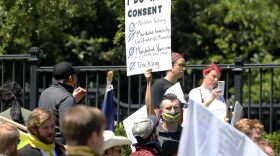From Texas Standard:
COVID-19 has had a massive impact on retail businesses, as customers stay home to stay safe from the virus. But the "new normal" is also affecting the way political candidates campaign for office.
Staples like door-to-door canvassing, voter registration drives at shopping malls and physical contact – kissing babies and taking selfies – between candidates and voters, have mostly been off the menu of campaign options so far. Could this change as restrictions on public activities are relaxed in Texas, and as President Donald Trump continues to hold large campaign rallies?
Gromer Jeffers is a political writer for The Dallas Morning News. He told Texas Standard that some candidates are following Trump's lead.
"In politics, as you know, in-person contact is the best way to move votes, to sway a voter," Jeffers said. "And if you're not doing that, you are at risk of not reaching voters – their hearts and minds – and therefore at risk of losing."
In U.S. House District 24, Republican Beth Van Duyne "never really stopped" campaigning in person, Jeffers said. "She was handing out food at food banks, and things, in March when we really got in this pandemic."
Candace Valenzuela, the Democrat running against Van Duyne, provides a contrast. She hasn't been doing in-person campaign events.
"She lives in a multigenerational home. She has an older mother-in-law. She has children with various issues," Jeffers said. "She does not want to risk bringing COVID-19 back to the home, and she doesn't want to risk campaign volunteers getting sick either."
Jeffers said an advantage to online-only campaigning for voters looking to learn about candidates is that they can tune into a video call even if they can't attend an in-person rally or candidates' forum.
Jeffers pointed out that races of the past have been defined by the rallies and in-person contacts candidates made. That was certainly the case in the 2018 Senate race between Ted Cruz and Beto O'Rourke, as well as the 2008 presidential race when Barack Obama inspired thousands of supporters at rallies around the country.
"Retail politics is where it's at," Jeffers said.


